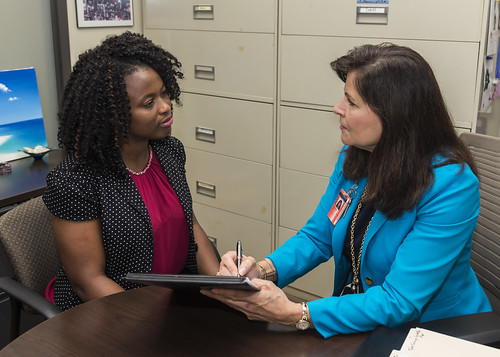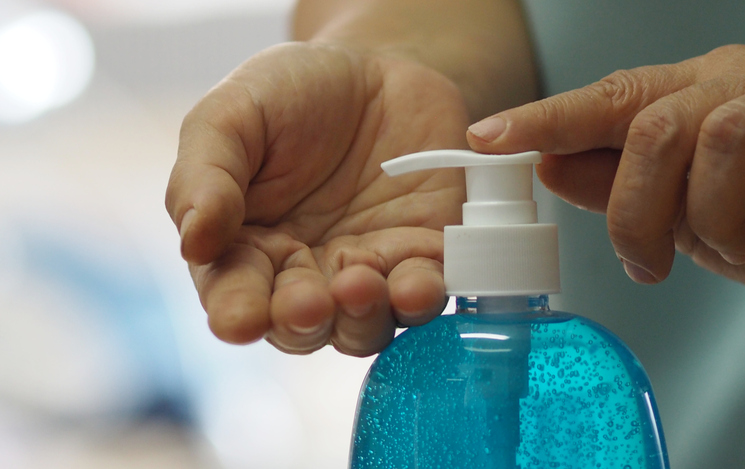Learning healthy habits is vital in the time of COVID-19
Article body
With the news of COVID-19 spreading throughout the United States, most look to health care providers for information on how to treat or cure the disease. Just as important, according to the Harrison School of Pharmacy’s Jan Kavookjian, is learning new preventive healthy habits in our daily lives.
Kavookjian, an associate professor in the Department of Health Outcomes Research and Policy, is an expert on human health behavior when it comes to making healthy decisions and taking medication properly.
One of the biggest factors in the spread of COVID-19 is the decision by some to not take precautions or make changes in their daily lives to embrace preventive practices like social distancing, quarantine and elevated cleanliness.
“There are several established intrapersonal behavior theories that explain or predict how an individual person may or may not decide to take action on any given health behavior,” said Kavookjian. “We are being asked to wash our hands frequently, not touch our faces, cough or sneeze into our elbows, clean our surfaces more frequently, stay at home and not gather with other people in ways that are part of the social norms within our society, including staying six feet away from other people, among many other things.”
There are three prevalent health behavior theories addressing individual health behavior decision making. Transtheoretical Model of Change includes a continuum of stages of motivational and behavioral readiness for changing a behavior while the Theory of Reasoned Action/Theory of Planned Behavior includes, among other things, a construct for intention to engage in the target behavior. The Health Belief Model encompasses the influence of an individual’s perceptions of susceptibility and threat/severity, as well as cues to action and confidence to take action, and how these explain and predict the decision to engage in a health behavior.
“Many of our beliefs are formed by our experiences and by the way we were socialized to health and healthy behaviors in our family environments during developmental years,” said Kavookjian. “Some grew up in families where parents or caregivers reacted significantly to illness or potential illness and therefore, the norm in those families was to take action towards prevention or cure. Or, perhaps someone among a person’s family or friends had a severe illness or health event; this has been shown to significantly raise perception of susceptibility and threat and influence a person’s decision-making for preventive behaviors.”
Also, because COVID-19 first appeared in China, people may still feel some separation from it and do not believe they are susceptible.
“In the case of COVID-19, when it first emerged, many saw it happen far away, on the other side of the Earth, and perceived low threat,” said Kavookjian. “In addition, most Americans have not had a family member or friend get hospitalized or pass away from an infectious disease in today’s U.S. health care system.”
Among Kavookjian’s specialties is a health behavior communication approach called motivational interviewing where practitioners are trained in constructive ways to communicate with others about healthy habits. Embracing this style of communications could be key in facilitating positive decisions about preventive health behaviors with someone still resisting change.
“In the case of COVID-19, it is not just a personal consequence but also a societal impact when one does not engage in hand washing and social distancing, among other behaviors,” said Kavookjian. “As humans, we feel an instinctive urge to advise and tell the person what they are doing wrong, but the evidence shows that a vast majority of humans will feel violated by this. We want to make our own decisions and will tend to be much more influenced by what we hear ourselves say over what we hear others tell us to do.
“So, if we tell someone to do something, such as social distancing, and they feel violated by this, they will get defensive. This causes more harm than good because the very process of defending why not to make the change, reinforces not making the change because the person hears him or herself express why the change is not important or is difficult.”
Instead, Kavookjian suggests interviewing people in a way that they hear themselves respond about the change or consequences. Some questions to start a conversation with might include:
-
What have you heard about things we can do to help prevent the spread of COVID-19?
-
What are goals you think you can set for yourself to increase how often you wash your hands to help reduce the chance of getting or spreading the virus?
-
What have you heard about how important it is to avoid being near other people whose virus status is unknown?
-
What do you know about things that can happen if someone in our family gets the virus and comes in contact with our older relative?
A key component is next responding in a constructive manner with follow-up questions like:
-
Do you mind if I make a suggestion?
-
If it is okay with you, I’d like to tell you what I learned about this.
-
Can I tell you what the CDC says about this?
-
I’d like to share what the guidelines say we should be doing, if you don’t mind.
“These types of responses come from the impactful motivational interviewing approach, which has been particularly effective when used with persons who are resistant to change and is especially effective in talking with teens whose individual identities are in development,” said Kavookjian. “Adolescents need the esteem-building that comes with autonomy supportive communication strategies from adults in their lives and are much more likely to respond favorably to health behavior goal setting when autonomy-supporting strategies like these are used.”
Kavookjian admits that making changes can be difficult, particularly when you are so accustomed to behaving in a particular way for most of your life. She suggests taking small steps and making daily changes, much like you would a New Year’s resolution.
“We all started 2020 thinking we were setting goals for health behaviors like being active and healthy eating, and now we’re being asked to do all these other COVID-19 prevention behaviors that bring significant change throughout our day,” said Kavookjian. As with any health behavior change, to make it stick often requires a mindful decision and awareness of how our perceptions influence our behavior.”
She references back to the Health Belief Model and its concept of building confidence to engage the behavior. Confidence, or self-efficacy, is consistently a robust predictor of actually making a change and by having small successes when setting incremental goals, people can increase their own confidence to engage in progressively bigger changes for a behavior. Additionally, including cues to action around oneself can trigger deciding to act on a behavior. These cues are obvious reminders to practice these new healthy habits.
“For COVID-19 prevention efforts at our house, we have decided that every time we come home from being out, the first thing we do is take off shoes at the door and go to the sink and wash hands,” said Kavookjian. “Putting a basket for shoes right by the entry is a cue to action as we enter to put our shoes there, and the putting of the shoes in the basket reminds us to go wash hands next.”
She suggests a website developed by Stanford behavior scientist Dr. B.J. Fogg called www.tinyhabits.com. It offers a brief online program, currently being offered for free, that focuses on how to effectively set and keep specific goals for the behaviors needed to help prevent COVID-19 and its spread.
“Mindfully thinking about the long-run purpose and vision of helping return our society to its former way of life can also reinforce our resolve to maintain these preventive actions,” said Kavookjian.
Auburn University is a nationally ranked land grant institution recognized for its commitment to world-class scholarship, interdisciplinary research with an elite, top-tier Carnegie R1 classification, life-changing outreach with Carnegie’s Community Engagement designation and an undergraduate education experience second to none. Auburn is home to more than 30,000 students, and its faculty and research partners collaborate to develop and deliver meaningful scholarship, science and technology-based advancements that meet pressing regional, national and global needs. Auburn’s commitment to active student engagement, professional success and public/private partnership drives a growing reputation for outreach and extension that delivers broad economic, health and societal impact.







